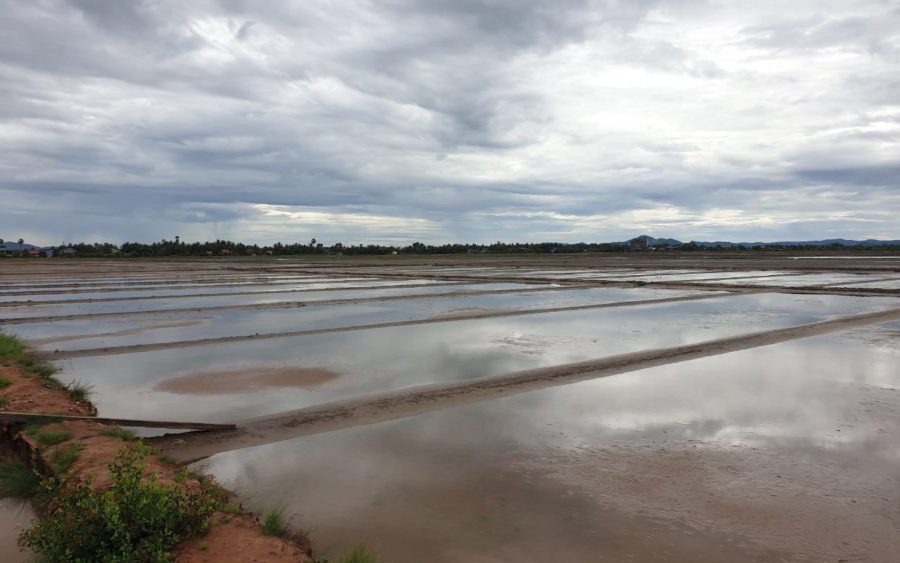Salt fields on lucrative Kampot coastland are being promised the backing of a new governmental working group to aid in competition against Thai and Vietnamese imports, but salt farmers are skeptical.
A sub-decree from May, released publicly this week, details the creation of an inter-ministerial committee to incentivize salt production.
The committee would be tasked with providing loans and seed funding for developing salt products, promoting the formation of co-operative communities for producers, and expanding the capacity of salt warehouses.
The letter, signed by Finance Minister Aun Pornmoniroth, additionally calls on the committee to study measures to prevent illegal salt imports.
Salt producers such as Long Im, who pulls salt from about 5 hectares of land in Kampot province, said they have struggled to compete with cheaper, better-quality imports from Thailand and Vietnam.
Im said labor shortages were also a challenge, as young people preferred to work in factories or elsewhere, leaving only old people to keep up the salt fields. In Cambodia, salt production is typically done by flooding fields with seawater, waiting for the water to evaporate and scraping up the remaining salt. However, Im said, producers are finding a hard time yielding enough salt to make the practice worth it.
“People continue to sell their salt farms,” he explained, “since their harvest is not good, they want money to support their living.”
Land on the coast can be worth hundreds of dollars per square meter, though the Industry Ministry since 2017 has tried to block the sales of salt flats in order to protect the industry.
Tong Khloeung, a fellow producer who harvests salt from a 40-hectare plot in Kampot province’s Thoek Chhou district, said the local salt co-op community there dissolved a few years ago. Today, farmers sell their products independently, without company oversight.
Khloeung said he prefers the current arrangement over the previous model of pooled selling and revenue-sharing through the community.
Salt producers in his area had dealt with a labor shortage about two years ago, he said, but the onset of the pandemic helped resolve that issue by keeping workers closer to home, as opposed to moving to work in factories or as migrants in Thailand.
“Before Covid, workers had flooded to work in the factories. We had a shortage of labor so that some farmers could not grow a full salt farm,” Khloeung said. “Now there are a lot of workers, since they cannot migrate [out of the country] and domestically they struggle to find jobs. During the salt season, they flood to work in the salt farms.”
However, he explained some of the local salt farms have been bought out and left idle by their new owners. Khloeung said they did this to reduce salt supply and push the price of salt higher.
Some natural factors have colluded in reducing supply, but not necessarily helping in raising prices.
Khloeung said Cambodian production was hurt this year by rainy conditions, but that producers in Vietnam and Thailand were helped by drier weather.
He expected to see more salt entering the domestic market from those countries and said it’s already difficult for Cambodian producers to compete on both price and quality.
The new inter-ministerial salt committee would be made up of 17 people and chaired by Hean Sahip, the Finance Ministry’s secretary of state. Other members include Pich Sambath, the ministry’s under-secretary of state, and Sun Seng Huot, an under-secretary of state with the Ministry of Industry. The rest would be drawn from the Ministry of Commerce and provincial authorities.
A Finance Ministry spokesperson could not be reached for comment.
When asked about the new committee to help producers, Khloeung said he’d heard of similar government measures in the past but had seen little in the way of actual help.
“We’ve heard of [such programs] when the community still existed but that work was not fruitful and now we’ve already split up — there was nothing, and this caused a slip-up for the community.”
“Their policy is just saying [it] but never implementing it.”












